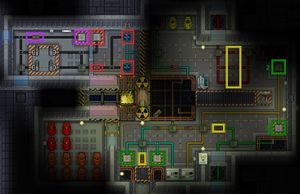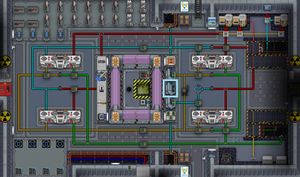Difference between revisions of "Supermatter Engine ErisEn"
(Add note about using 4 canisters per loop and clarify eer advice) |
Jack Frost1 (talk | contribs) m (→Quickstart) |
||
| Line 12: | Line 12: | ||
# Repeat the search for injection port on the computer in the cyan rectangle. |
# Repeat the search for injection port on the computer in the cyan rectangle. |
||
# Once the canisters in the green squares are empty, replace with four more canisters of the appropriate types. |
# Once the canisters in the green squares are empty, replace with four more canisters of the appropriate types. |
||
| + | # Be sure to use the RCON console (found in the room with the computer in the cyan square) to turn on substations that are off back on and allocate more or less power to substations that need it. |
||
# (Optional) Double check everything. |
# (Optional) Double check everything. |
||
# Start SM. |
# Start SM. |
||
| Line 21: | Line 22: | ||
It's also a good idea to upgrade the two SMES units (the ones side by side in the computer picture) using the parts in one of the crates south of them. |
It's also a good idea to upgrade the two SMES units (the ones side by side in the computer picture) using the parts in one of the crates south of them. |
||
| + | |||
| + | Remember to download the shield modification program to turn on the shields and explore the extra options as well as tinkering with the input cap |
||
== Basic Principles == |
== Basic Principles == |
||
Revision as of 13:09, 23 April 2019
The supermatter is the core of power generation aboard the Eris. Don't touch, or even look at it unprotected.
Quickstart
- Wrench canisters in ports in green squares. Plasma for (2) and Nitrogen for (1), but you also can use Plasma for both
- Turn on pumps in yellow squares. IMPORTANT: Set them to max, else your TEGs won't be efficient
- Set up omni-filters in red squares. Set it to filter gas that was wrenched in ports in green squares (1). Turn on pump in red square. Wrench empty canister in port in red square.
- (Optional, but highly recommended) Wrench a Nitrogen canister to the port in the purple square and turn the purple pump to max.
- Head to the only computer on the lower level. Search for the inject port.
- Repeat the search for injection port on the computer in the cyan rectangle.
- Once the canisters in the green squares are empty, replace with four more canisters of the appropriate types.
- Be sure to use the RCON console (found in the room with the computer in the cyan square) to turn on substations that are off back on and allocate more or less power to substations that need it.
- (Optional) Double check everything.
- Start SM.
Usually you don't want your EER be too high, so use about 12-16 emitter shots for Nitrogen setup. It will eventually get lower, so check it sometimes. Plasma setup can withstand EER up to 1500+. You can simply just leave emitter on since it's bottlenecks at ~1400.
TEG power output depends on: differences between temperatures in both loops and amounts of moles in both loops. More moles = more power, so it's good idea to introduce more gases to the loops.
It's also a good idea to upgrade the two SMES units (the ones side by side in the computer picture) using the parts in one of the crates south of them.
Remember to download the shield modification program to turn on the shields and explore the extra options as well as tinkering with the input cap
Basic Principles
The Generators
The core power generation is done by the Thermo-Electric Generators (TEGs). There are four in the engine, and they are powered by the flow of two gasses of differing temperature through their two sides. The larger the temperature difference, the more power generated. Note that they are less efficient when generating more than 500kW, but are not harmed by doing so, despite the intermittent sparks generated.
Gas Loops
There are two gas loops in the engine, the cold loop and the hot loop. By mixing in the generator, the temperature of the gasses are equalized somewhat, so the hotter gas should be reheated, and the cooler gas should be cooled. This is where the supermatter comes in. The cold loop flows from red pipe, to generators, to the green pipe, then out to radiators in space to cool back down. The hot loop flows from yellow pipe, to blue pipe, then into the supermatter chamber to be reheated. The supermatter, when excited, produces a large amount of heat, and will probably burn some of the plasma in the hot loop. In order to remove the products of this combustion, everything except plasma is filtered from the hot loop.


